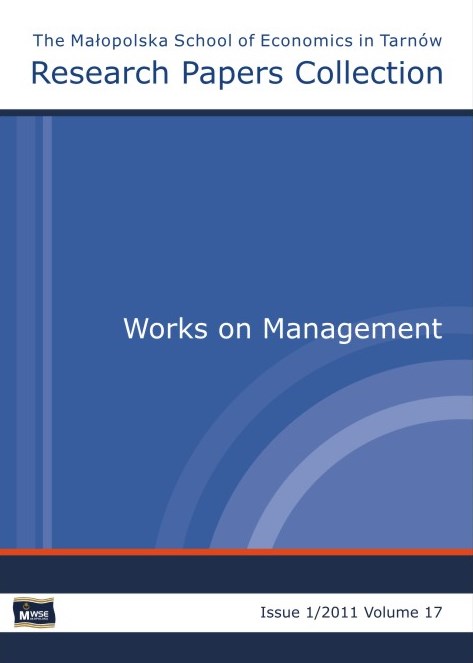Abstract
The origin of the studies on human capital as one of the most important economic resources is presented in the first part of the paper. Then, the concept of human capital is discussed which explores the general model of capital by Mieczysław Dobija. In the light of this concept, human capital is the capital embodied in human resources. The rules for measuring have been also given which allow isolation of the structure of human capital. The principles of payment for work of human capital are given in the following part of the paper. These principles result from the nature of capital. The most significant impact to which human capital is exposed are the forces that fragment its value. Maintaining this value requires the appropriate compensating stream. Otherwise, the value of human capital will be degraded, which leads to a number of negative micro- and macroeconomic consequences. It has also been proven that the proper institutional solutions and attitudes of people may help human capital increase with benefits for the entire population. The process of increasing of human capital is happening in the family (household). The last part of the paper provides analysis of the factors which have positive or negative effect on the value of human capital. The entire discussion has been properly summarised.
References
Cahuc P., Zylberberg A., Labor Economics, The MIT Press, Cambridge – London 2004. ISBN 0-262-03316-X.
View in Google Scholar
Dobija D., Pomiar i sprawozdawczość kapitału intelektualnego przedsiębiorstwa, Wyższa Szkoła Przedsiębiorczości i Zarządzania im. L. Koźmińskiego, Warszawa 2003. ISBN 83-89437-08-2.
View in Google Scholar
Dobija M. (red.), Teoria pomiaru kapitału i zysku, Uniwersytet Ekonomiczny w Krakowie, Kraków 2010. ISBN 978-83-7252-500-0.
View in Google Scholar
Dobija M., Fundamentalne przyczyny kryzysów finansowych, „Zeszyty Naukowe Małopolskiej Wyższej Szkoły Ekonomicznej w Tarnowie” 2009, nr 2(13).
View in Google Scholar
Dobija M., Kapitał ludzki i intelektualny w aspekcie teorii rachunkowości, „Przegląd Organizacji” 2002, nr 1, s. 8–13.
View in Google Scholar
Dziennik Urzędowy UE C318/14.
View in Google Scholar
Hayter S., Institutions and Labour Policy in an Integrating World, In: Globalization, Growth and (In)Equality, University of Warwick, 2002.
View in Google Scholar
Kozioł W., Stała ekonomiczna potencjalnego wzrostu, W: M.G. Woźniak (red.), Nierówności ekonomiczne a wzrost gospodarczy, „Zeszyty Naukowe Uniwersytetu Rzeszowskiego”, Rzeszów 2011.
View in Google Scholar
Pałaszewska–Reindl T., Michna W., Gospodarstwo domowe – ekonomiczna i organizacyjna baza rodziny polskiej, W: T. Pałaszewska–Reindl (red.), Polskie gospodarstwa domowe: życie codzienne w kryzysie, Instytut Wydawniczy Związków Zawodowych, Warszawa 1986. ISBN 83-202-0486-0.
View in Google Scholar
Przybyła H., Sposób ujęcia ekonomii politycznej i gospodarki w szkole szwedzkiej, W: U. Zagóra-Jonszta (red.), Dokonania współczesnej myśli ekonomicznej – teorie ekonomiczne a polityka gospodarcza państw, Wyd. Uczelniane AE w Katowicach, Katowice 2001. ISBN 83-7246-889-3.
View in Google Scholar
Rawls J., Teoria sprawiedliwości, wyd. 2, przeł. M. Panufnik, A. Romaniuk, Wydawnictwo Naukowe PWN, Warszawa 2009. ISBN 978-83-01-16173-6.
View in Google Scholar
Schultz T., Investing in People. The Economics of Population Quality, University of California Press, Berkeley 1981.
View in Google Scholar
© Copyright by Małopolska School of Economics in Tarnów. The articles are available under the Creative Commons Attribution NonCommercial-NoDerivatives 4.0 International License


